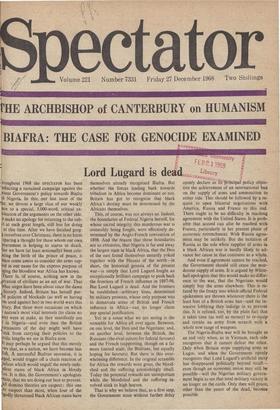F E px 1 969
'kqs. aly
—Xi3;f - • Lord Lugard is deice," roughout 1968 the SPECTATOR has been Inducting a sustained campaign against the esent Government's policy towards Biafra d Nigeria. In this, our last issue of the r, we devote a large slice of our weekly ace to a special, 5,000-word, critical ex- lination of the arguments on the other side.
Itiourselves over Christmas, there is no harm sparing a thought for those whom our own vernment is helping to starve to death. ter we have (at least notionally) been cele- ting the birth of the prince of peace, it of come amiss to consider the arms sup- ed in our name for the express purpose of ging the bloodiest war Africa has known. ?here is, of course, nothing new in the r.tvation of civilians as an act of war. That 'hat sieges have been about since the dawn j history. Indeed, Britain has herself pur- N policies of blockade (as well as having fin used against her) in two world wars this tury. But those were occasions on which nation's most vital interests (to claim no re) were at stake, as they manifestly are in Nigeria—and even then the British ,ernments of the day might well have unk from carrying their policies to the irific lengths we see in Biafra now. t may perhaps be argued that this merely hvs that, as a nation, we have become less fish. A successful ttiafran secession, it is 10 ged. would trigger off a chain reaction of lism which would engulf the newly-inde- dent states of black Africa in bloody s. It is this, the Government's apologists lain, that we are doing our best to prevent. l domino theories are suspect : this one e suspect than most, when four of the gedly threatened black African states have themselves already recognised Biafra. But whether the forces leading back towards tribalism in Africa become dominant or not, Britain has got to recognise that black Africa's destiny must be determined by the Africans themselves.
This, of course, was not always so. Indeed, the boundaries of Federal Nigeria herself, for whose sacred integrity this murderous war is ostensibly being fought, were effectively de- termined by the Anglo-French convention of 1898. And the reason that those boundaries are so extensive, that Nigeria is far and away the largest state in black Africa, that the Ibos of the east found themselves uneasily yoked together with the Hausas of the north—in short, the historical genesis of the present war—is simply that Lord Lugard fought an exceptionally brilliant campaign to push back the frontiers of French influence in 1897-98. But Lord Lugard is dead. And the frontiers he established—arbitrary lines, determined by military prowess, whose only purpose was to demarcate areas of British and French influence in Africa—can no longer claim any special justification.
Yet in a sense what we are seeing is the scramble for Africa all over again. Between, on one level, the Ibos and the Nigerians; and, on another level, between the British, the Russians (the rival suitors for federal favours) and the French (supporting, though on a far more limited scale, the Biafrans, but equally hoping for favours). But there is this over- whelming difference. In the original scramble for Africa the rewards were great, the blood- shed and the suffering astonishingly small. Today the potential rewards are unimportant while the bloodshed and the suffering in- volved stink to high heaven. openly declare as .1 g rihopal policy objec- tive the achievement of an international ban on the supply of arms and ammunition to either side. This should be followed by a re- quest to open bilateral negotiations with America, Russia and France to this end. There ought to be no difficulty in reaching agreement with the United States. It is prob- able that accord can also be reached with France, particularly in her present phase of economic retrenchment. With Russia agree- ment may be unlikely. But the isolation of Russia as the sole white supplier of arms in a black African war is hardly likely to ad- vance her cause in that continent as a whole.
And even if agreement cannot be reached, the Government should still cease the mur- derous supply of arms. It is argued by White- hall apologists that this would make no differ- ence to the war, that the Nigerians would simply buy the arms elsewhere. This is re- futed by the frenzy into which official,Federal spokesmen are thrown whenever there is the least hint of a British arms ban—and the in- tensive lobbying they indulge in to prevent this. It is refuted, too, by the plain fact that it takes time (as well as money) to re-equip and retrain an army from -scratch with a whole new range of weapons.
The Nigeria-Biafra war will be brought to an end only when, as in Vietnam, each side recognises that it cannot defeat the other. Only when Britain stops supplying arms to Lagos, and when the Government openly recognises that Lord Lugard's artificial unity has disappeared politically beyond recall— even though an economic union may still be possible—will the Nigerian military govern- ment begin to see that total military victory is no longer on the cards. Only then will peace, other than the peace of the dead, become possible.


































